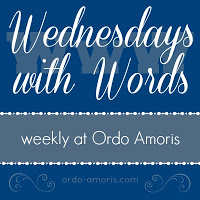Wordy Wednesday: Fundamentally About Shaping Loves
I’m reading the new book about Christian Classical Education from Classical Academic Press. I’m still in the introduction, but am finding it to be excellent so far (and going right along with what so many are posting in Desiring the Kingdom). The book is called The Liberal Arts Tradition by Kevin Clark and Ravi Scott Jain. I included a quote in my Daybook on Monday, and would share another today.
The foundational distinction between traditional education and modern education is that the ancients believed that education was fundamentally about shaping loves. What one loved and treasured could be right or wrong according to how that love accorded to the structure of reality. A prescribed set of cultural norms reflected this understanding and these values could indeed be taught. Personal values were not simply explored or discovered on one’s own, but were passed down and lived out. This required trust and commitment, and thus piety, the proper love and fear of God and man, was the critical virtue. It aligned one’s will with the family, society, and God, and expected the young pupil’s desires, beliefs, and habits to be shaped over years in the process of incarnating them. Piety required faithful devotion manifested in action. Education was enculturation in piety, virtue, wisdom, and grace, and the curriculum served the culture. (pg 4, emphasis mine)
Linked to Wednesdays with Words at Ordo-Amoris. Join us with a quote from your current read!


I really loved that book and found it inspired me even in the area of the maths and sciences. Not everyone I suggested it to loved it but I am happy you are enjoying it.
I appreciate this quote but am afraid I don't have the wherewithal to read a lengthy tome on classical education, unfortunately.
Amy, it's only 163 pages and the last 25 are Appendices, Bibliography, and Index. It's very readable so far. Even the self-described dense introduction.